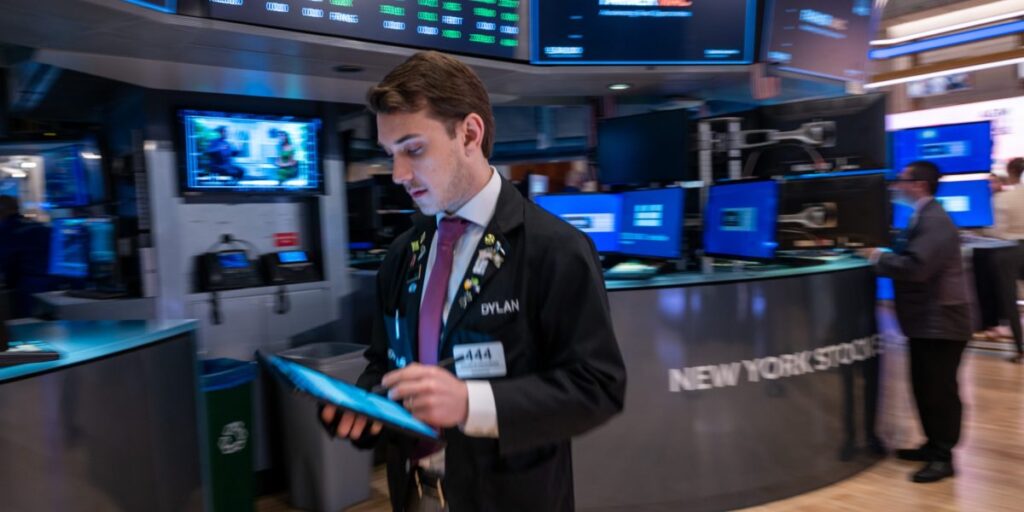
The Dow Jones Industrial Average topped the 40,000 level for the first time on Thursday as U.S. stocks edged closer to their records set a day earlier.
The Dow rose 69 points, or 0.2%, to 39,967 in afternoon trading. It topped 40,000 earlier in trading, making its latest jump of 10,000 in about three-and-a-half years as the US economy and corporate profits crawled out of the Covid-19 crisis. They have held on so far despite the worst inflation in decades, the punitive effects of high interest rates and fears of a recession that seemed inevitable but never came.
The S&P 500, which is much more closely watched on Wall Street and which determines the returns of many more 401(k) accounts than the Dow, was 0.1% higher as of 1:22 p.m. ET. The Nasdaq index fell 0.1%. They rose to record highs on Wednesday.
Walmart was one of the strongest forces that lifted the market, and it grew 6.5% after that. higher profit report for the latest quarter than analysts expected. The company also said its full-year revenue could exceed the guidance range it had previously given.
Walmart’s strength could be an encouraging sign for the broader economy. Concerns are growing over whether American households will be able to cope with still-high inflation, even if it is not as bad as before, and more expensive credit card payments. especially those with lower incomes.
Shares of Target, which will report its quarterly results next week, rose after Walmart’s report, along with other retailers such as Dollar General and Dollar Tree. Each gained at least 2.9%.
Chubb shares rose 4.2% after Warren Buffett’s Berkshire Hathaway Revealed he acquired a stake in an insurance company.
Stronger-than-expected earnings reports were one of the main reasons U.S. stocks jumped to records in May after a tough April. Hopes have also been raised that the Federal Reserve may cut its key interest rate at least once or twice this year. The Fed is keeping the federal funds rate at its highest level in more than two decades.
A series of worse than expected inflation reports at the beginning of the year jeopardized the possibility of such cuts, but some more encouraging data has since arrived.
Treasury yields fell in May as hopes grew that the economy could reach a desired sweet spot, where it would cool enough from high interest rates to quell inflation but not so much as to trigger a severe recession. Yields rose on Thursday following some mixed economic data.
One report showed a little more workers applied for unemployment benefits Last week’s profits were larger than economists had expected, although the number remains low compared with the historical period. Others said homebuilders completed fewer projects than expected last month, manufacturing growth in the mid-Atlantic region was weaker than expected and import prices rose more than expected.
“Today’s numbers were consistent with the overall theme of the week – nothing dramatic, but they showed signs of a steady cooling of the economy,” said Chris Larkin, managing director of trading and investments at E-Trade at Morgan Stanley.
The yield on the 10-year Treasury note rose to 4.37% from 4.35% late Wednesday. The two-year yield, which is more closely tied to expectations for Fed action, rose to 4.78% from 4.72%.
Amid losses on Wall Street, Deere shares fell 4% despite reporting better-than-expected profit for the latest quarter. This lowered profit forecast for the full fiscal year, below analysts’ estimates as farmers bought fewer tractors and other equipment.
Homebuilder indexes fell after a weaker-than-expected home construction report. They gave back some of their big gains the day before when hopes for lower mortgage rates sent them soaring. Lennar shares fell 2.1% and DR Horton shares fell 2.5%.
GameStop and AMC Entertainment fell for the second day in a row, retreating further from their positions. amazing start to the week. They were driven more by investor unrest than by any changes in their financial outlook.
GameStop fell 20.72%, although it is still up nearly 80% for the week. AMC Entertainment lost 10%.
Under Armor swung between losses and gains after warning that its revenue would likely decline by a “low double-digit percentage” in the coming fiscal year, citing weaker demand from wholesalers and “inconsistent execution across our business.” . The company announced a restructuring plan to cut costs and also announced a share repurchase program of up to $500 million. It decreased by 0.6%.
Overseas stock markets in most European countries were moderately lower following mostly strong gains in Asia. Hong Kong’s Hang Seng jumped 1.6% as it reopened after the holiday, while Japan’s Nikkei 225 rose 1.4%.


